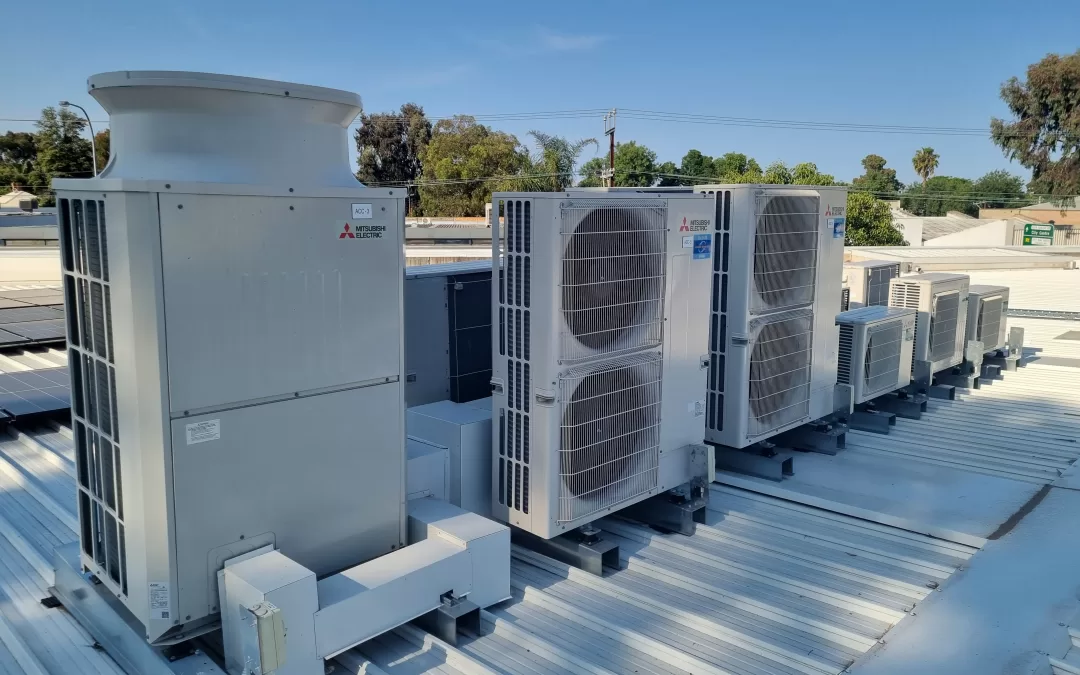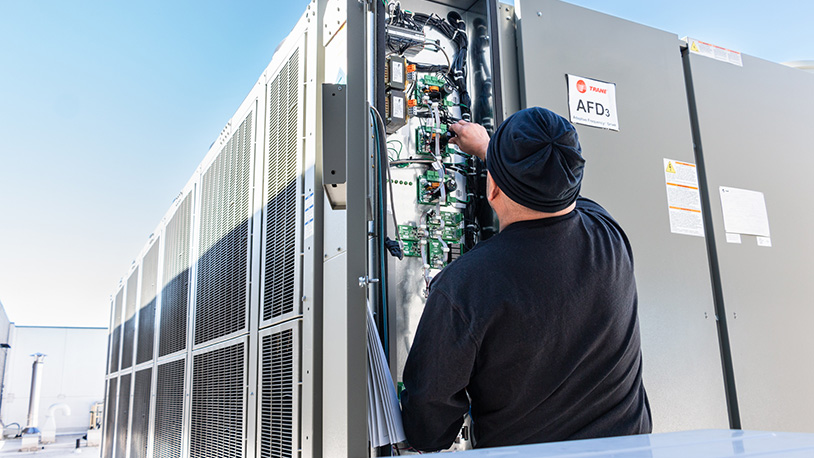Discover how HVAC experts enhance ventilation efficiency quickly
Wiki Article
Exploring the Vital Components of a Reliable HVAC System
An efficient heating and cooling system is improved several critical components that function in harmony. Each component, from the thermostat to the ductwork, plays a vital role in preserving comfort and energy effectiveness. Recognizing these aspects is essential for enhancing performance and enhancing interior air high quality. As one checks out these components, the detailed relationships in between them reveal understandings right into boosting general system efficiency. What certain variables contribute most to this effectiveness?The Function of the Thermostat in Heating And Cooling Effectiveness

Frequently neglected, the thermostat plays a vital function in the performance of Heating and cooling systems. This tiny device works as the key control facility, managing temperature setups and ensuring perfect comfort within a room. By precisely sensing the ambient temperature, the thermostat connects with the air flow, air, and home heating conditioning devices to maintain the desired environment
An effective thermostat reduces energy intake by triggering the a/c system just when needed, consequently stopping too much heating or air conditioning. Modern programmable and smart thermostats enhance this effectiveness additionally by permitting users to set routines and from another location change settings, adapting to daily regimens.
In addition, the positioning of the thermostat is vital; improper location can cause incorrect temperature analyses, leading to inefficient procedure. Generally, a well-functioning thermostat not just improves comfort yet also adds substantially to power cost savings and the durability of the a/c system.
Understanding the Relevance of Air Filters
Air filters serve a necessary feature in a/c systems by assuring that the air circulating within a space stays healthy and balanced and tidy. These filters catch dust, irritants, and various other contaminants, stopping them from being recirculated throughout the environment. By capturing these particles, air filters contribute to improved indoor air top quality, which can greatly profit residents' health and wellness, especially those with allergic reactions or respiratory system conditions.Furthermore, keeping clean air filters enhances the effectiveness of a/c systems. Clogged up filters can limit airflow, triggering the system to function more challenging to keep desired temperatures, leading to enhanced energy intake and higher energy bills. Frequently replacing or cleaning up filters is an important maintenance action that can prolong the lifespan of HVAC devices. Eventually, comprehending the importance of air filters enables house owners and structure managers to take proactive actions to guarantee a well-functioning, reliable a/c system that promotes a risk-free and comfortable indoor setting.

The Functionality of the Furnace and Warm Pump
Furnaces and heatpump are critical components of heating and cooling systems, in charge of supplying heat throughout colder months. Heating systems run by heating air through burning or electric resistance, after that distributing it throughout the home by means of air ducts. They usually provide quick home heating and can be sustained by gas, electricity, or oil, depending upon the system kind.Alternatively, warm pumps move warm instead of generate it. They extract warm from the outdoors air or ground, also in reduced temperatures, and move it inside. HVAC experts. This dual capability enables heatpump to additionally give cooling in warmer months, making them functional options for year-round climate control
Both systems require appropriate maintenance to guarantee performance and longevity. While heaters stand out in severe cold, warm pumps can be useful in moderate climates. Comprehending their distinct capabilities aids property owners in choosing one of the most ideal option for their heating needs.
Checking Out the Air Conditioning Unit
The cooling unit is a vital component of HVAC systems, available in different kinds to suit different requirements. Comprehending the efficiency rankings of these systems is necessary for making notified selections regarding energy intake and cost. This section will certainly explore the diverse sorts of air conditioning system and clear up just how performance scores influence efficiency.Kinds Of Air Conditioners
While various aspects influence the selection of cooling systems, recognizing the different kinds readily available is crucial for homeowners and building supervisors alike. Central air conditioning conditioners are created to cool down entire homes or buildings, making use of a network of ducts for airflow. Window units supply a more local remedy, perfect for tiny rooms or solitary areas. Mobile a/c unit supply flexibility, enabling users to relocate the system as needed. Ductless mini-split systems are one more choice, integrating the effectiveness of central systems with the benefit of zoning, as they require no ductwork. Finally, geothermal systems harness the planet's temperature level for energy-efficient cooling. Each kind look at these guys comes with distinct benefits, making informed selections important for reliable climate control.
Efficiency Ratings Explained
Recognizing performance scores is necessary for choosing the appropriate air conditioning unit, as these metrics provide understanding into the system's efficiency and energy consumption. One of the most common score for a/c is the Seasonal Energy Effectiveness Proportion (SEER), which determines the cooling result throughout a typical air conditioning period separated by the complete electric power input. A higher SEER indicates better effectiveness. Additionally, the Energy Performance Proportion (EER) is utilized for gauging effectiveness under details problems. An additional important metric is the Power Celebrity accreditation, which symbolizes that a device satisfies rigorous energy efficiency standards. By reviewing these scores, customers can make informed selections that not just optimize convenience but likewise lower energy prices and environmental effect.The Significance of Ductwork and Airflow
Efficient ductwork layout and airflow administration play crucial roles in the general effectiveness and efficiency of heating and cooling systems. Proper ductwork assurances that conditioned air is dispersed uniformly throughout an area, decreasing temperature variations and enhancing convenience. Properly designed ducts lessen resistance to airflow, minimizing the workload on HVAC tools and eventually decreasing energy intake.Air movement management involves tactically placing vents and registers to improve the flow of air. This stops typical concerns such as cool or warm areas, which can take place when air movement is blocked or improperly balanced. In addition, the right duct products and insulation can additionally improve efficiency by decreasing warmth loss or gain throughout air transit.
An efficient ductwork system not just adds to power cost savings but can likewise prolong the lifespan of HVAC equipment by lowering unnecessary strain (HVAC experts). Consequently, understanding the relevance of ductwork and air flow is essential for achieving peak HVAC system efficiency
Routine Maintenance Practices to Improve Performance
Normal maintenance methods are important for ensuring peak performance of cooling and heating systems. These techniques include regular inspections, cleaning, and essential repair services to keep the system running successfully. Consistently altering air filters is vital, as clogged up filters can obstruct airflow and minimize efficiency. On top of that, service technicians should inspect and tidy evaporator and condenser coils to stop overheating and power wastage.Annual expert examinations are also suggested, as trained service technicians can identify prospective concerns before they intensify. Oiling moving parts lessens wear and tear, adding to a much longer lifespan for the system. Making sure that the thermostat functions appropriately aids in keeping perfect temperature level control.
Regularly Asked Questions
Exactly how Usually Should I Replace My Thermostat?
Thermostats should generally be replaced every 5 to ten years, depending upon use and modern technology innovations. Regular checks are suggested to assure peak efficiency, specifically if experiencing inconsistent temperature level control or enhanced power expenses.What Size Air Filter Is Finest for My HVAC System?
The most effective dimension air filter for a HVAC system differs by system style. Usually, it's crucial to seek advice from the owner's guidebook or inspect the existing filter dimensions to ensure peak efficiency and air top quality.Can I Set Up a Heatpump Myself?
Setting get more up a warm pump independently is feasible for proficient individuals, however it calls for knowledge of electric systems and regional codes. Employing a specialist is recommended to assure correct installment and suitable system efficiency.Exactly how Do I Know if My Ductwork Is Effective?
To identify ductwork efficiency, one should look for leaks, measure air movement at vents, examine insulation quality, and examine temperature level distinctions in between supply and return ducts. Specialist assessments can offer thorough understandings into overall performance.What Are Indicators My Cooling And Heating Needs Immediate Upkeep?
Signs that a HVAC system requires immediate maintenance consist of unusual sounds, inconsistent temperature levels, boosted energy expenses, undesirable odors, and regular cycling. Dealing with these concerns immediately can protect against more damage and guarantee peak system performance.Air filters offer a crucial function in Heating and cooling systems by ensuring that the air circulating within a space remains healthy and clean. Additionally, maintaining tidy air filters enhances the performance of Cooling and heating systems. Ductless mini-split systems are one more alternative, combining the performance of central systems with the ease of zoning, as they call for no ductwork. more Understanding effectiveness scores is necessary for selecting the best air conditioning system, as these metrics supply insight right into the system's performance and energy usage. The best dimension air filter for a Heating and cooling system differs by unit design.
Report this wiki page